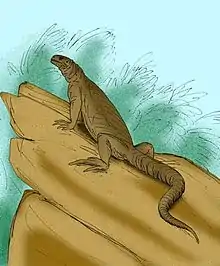| Pleurodontagama Temporal range: Late Cretaceous | |
|---|---|
| Scientific classification | |
| Domain: | Eukaryota |
| Kingdom: | Animalia |
| Phylum: | Chordata |
| Class: | Reptilia |
| Order: | Squamata |
| Suborder: | Iguania |
| Genus: | †Pleurodontagama Borsuk-Białynicka and Moody, 1984 |
| Type species | |
| †Pleurodontagama aenigmatodes Borsuk-Białynicka and Moody, 1984 | |
Pleurodontagama is an extinct genus of iguanian lizard from the Late Cretaceous of Mongolia. The type species, Pleurodontagama aenigmatodes, was named in 1984 on the basis of a mostly complete skull and isolated lower jaw from a fossil locality called Khermeen Tsav. It has a wide skull with a flat snout, large eye sockets, and small bumps on the surfaces of the bones.[1] Pleurodontagama was initially classified in the family Priscagamidae, which is usually grouped in a large clade of iguanians called Acrodonta, members of which are characterized by an "acrodont" dentition in which the teeth grow from the margins of the jaws. However, Pleurodontagama is unusual in that it has a sub-pleurodont dentition, meaning that some of its teeth grow from the inner surfaces of the jaw. There is also evidence to suggest that its teeth may have been continuously replaced throughout life, as opposed to the permanent teeth of acrodontans. Pleurodontagama may have been a transitional form between the derived acrodont type and the pleurodont type inferred for the ancestors of Acrodonta.[2]
References
- ↑ Borsuk-Białynicka, M.; Moody, S.M. (1984). "Priscagaminae, a new subfamily of the Agamidae (Sauria) from the Late Cretaceous of the Gobi Desert". Acta Palaeontologica Polonica. 29 (1–2): 51–81.
- ↑ Borsuk-Białynicka, M. (1996). "The Late Cretaceous lizard Pleurodontagama and the origin of tooth permanency in Lepidosauria". Acta Palaeontologica Polonica. 41 (3): 231–252.
